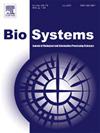Cognitive control and consciousness in open biological systems
IF 2
4区 生物学
Q2 BIOLOGY
引用次数: 0
Abstract
Thermodynamically open biological systems not only sustain a life-supporting mutual relationship with their environment by exchanging matter and energy but also constantly seek information to navigate probabilistic changes in their surroundings. This work argues that cognition and conscious thought should not be viewed in isolation but rather as parts of an integral control of biological systems to identify and act upon meaningful, semantic information to sustain viability. Under this framework, the development of key cognitive control capacities in centralized nervous systems and the resulting behavior are categorized into distinct Markov decision processes: decision-making with partially observable sensory exteroceptive and interoceptive information, learning and memory, and symbolic communication. It is proposed that the state of conscious thought arises from a control mechanism for speech production resembling actuator control in engineered systems. Also known as the phonological loop, this feedback from the motor to the sensory cortex provides a third type of information flowing into the sensory cortex. The continuous, dissipative loop updates the fleeting working memory and provides humans with an advanced layer of control through a sense of self, agency and perception of flow in time. These capacities define distinct degrees of information fitness in the evolution of information-powered organisms.
开放生物系统中的认知控制和意识。
热力学上开放的生物系统不仅通过交换物质和能量来维持与环境之间的相互关系,而且还不断寻求信息,以驾驭周围环境的概率变化。这项研究认为,不应孤立地看待认知和有意识的思维,而应将其视为生物系统整体控制的一部分,以识别有意义的语义信息并采取相应行动,从而维持生命力。在这一框架下,中枢神经系统中关键认知控制能力的发展以及由此产生的行为被归类为不同的马尔可夫决策过程:利用部分可观察到的外部感知和内部感知信息进行决策、学习和记忆以及符号交流。有人提出,有意识的思维状态产生于语言产生的控制机制,类似于工程系统中的执行器控制。这种从运动皮层到感觉皮层的反馈也被称为语音环路,它提供了流入感觉皮层的第三类信息。这种连续、耗散的环路更新了稍纵即逝的工作记忆,并通过自我意识、代理意识和对时间流的感知,为人类提供了一层高级控制能力。在以信息为动力的生物进化过程中,这些能力决定了不同程度的信息适应性。
本文章由计算机程序翻译,如有差异,请以英文原文为准。
求助全文
约1分钟内获得全文
求助全文
来源期刊

Biosystems
生物-生物学
CiteScore
3.70
自引率
18.80%
发文量
129
审稿时长
34 days
期刊介绍:
BioSystems encourages experimental, computational, and theoretical articles that link biology, evolutionary thinking, and the information processing sciences. The link areas form a circle that encompasses the fundamental nature of biological information processing, computational modeling of complex biological systems, evolutionary models of computation, the application of biological principles to the design of novel computing systems, and the use of biomolecular materials to synthesize artificial systems that capture essential principles of natural biological information processing.
 求助内容:
求助内容: 应助结果提醒方式:
应助结果提醒方式:


